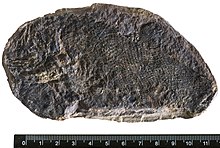Amblypterus (from Greek: ἀμβλύς amblys, 'blunt' and Greek: πτερόν pteron 'wing' or 'fin')[1] is an extinct genus of freshwater ray-finned fish that lived during the Gzhelian (upper Carboniferous) and Cisuralian (lower Permian) epoch in what is now Europe (Czech Republic, France, Germany, Switzerland) and possibly India and Argentina.[2][3] Potential indeterminate records stretch as far back as the early Carboniferous.[4]
| Amblypterus Temporal range:
| |
|---|---|

| |
| Amblypterus latus fossil | |
| Scientific classification | |
| Domain: | Eukaryota |
| Kingdom: | Animalia |
| Phylum: | Chordata |
| Class: | Actinopterygii |
| Order: | †Paramblypteriformes |
| Genus: | †Amblypterus Agassiz, 1833 |
| Type species | |
| †Amblypterus latus Agassiz, 1833
| |
| Species | |
|
See text | |

Taxonomy
editThis genus displays close similarities to Paramblypterus, to the extent that both may be synonymous, although presently they are considered distinct. The type specimen of A. latus is lost.[5]
Species
editThe following species are known:[4]
- A. arcuatus Egerton, 1850
- A. baylei Sauvage, 1890
- A. beaumonti Egerton, 1850
- A. berthieri Sauvage, 1893
- A. bibractensis Sauvage, 1893
- A. carolinae Hay, 1902
- A. caudatus Heckel & Kner, 1861
- A. decorus Egerton, 1850
- A. eupterygius Agassiz, 1833
- A. kashmiriensis Woodward & Seward, 1905
- A. latus Agassiz, 1833 (type species)
- A. macropterus (Bronn, 1829)
- A. magnus Sauvage, 1890
- A. obliquus Heckel & Kner, 1861
- A. orientalis Eichwald, 1860
- A. ornatus Emmons, 1857
- A. stewarti Romer, 1942
- A. symmetricus Woodward, 1905
- A. tenuicauda Troschel, 1851
- A. traquairi Woodward, 1891
Synonymy
edit- Amblypterus agassizi (Munster, 1835) → Gyrolepis agassizi Munster, 1835
- Amblypterus blainvillei (Agassiz, 1833) → Aeduella blainvillei (Agassiz, 1833) [= Palaeoniscus blainvillei Agassiz, 1833, Palaeothrissum inaequilobum Blainville, 1818][6]
- Amblypterus eurypterygius Agassiz, 1833 → Rhabdolepis macroptera (Bronn, 1829)
- Amblypterus lateralis Agassiz, 1833 → Amblypterus latus Agassiz, 1833
See also
editReferences
edit- ^ Roberts, George (1839). An etymological and explanatory dictionary of the terms and language of geology. London: Longman, Orme, Brown, Green, & Longmans. p. 6. Retrieved 29 December 2021.
- ^ Romano, Carlo; Koot, Martha B.; Kogan, Ilja; Brayard, Arnaud; Minikh, Alla V.; Brinkmann, Winand; Bucher, Hugo; Kriwet, Jürgen (2016). "Permian-Triassic Osteichthyes (bony fishes): diversity dynamics and body size evolution". Biological Reviews. 91 (1): 106–147. doi:10.1111/brv.12161. PMID 25431138. S2CID 5332637.
- ^ Dietze, Kathrin (2000). "A revision of paramblypterid and amblypterid actinopterygians from Upper Carboniferous-Lower Permian lacustrine deposits of Central Europe". Palaeontology. 43 (5): 927–966. Bibcode:2000Palgy..43..927D. doi:10.1111/1475-4983.00156.
- ^ a b "PBDB". paleobiodb.org. Retrieved 2024-02-16.
- ^ Muzeum, Národní. "New data on the osteology of the actinopterygian fish Amblypterus and the relationship between Amblypterus and Paramblypterus". National museum. Retrieved 2024-02-16.
- ^ Westoll, Thomas S. (1937). "LVII.—On a remarkable fish from the lower Permian of Autun, France". Annals and Magazine of Natural History. Series 10. 19 (114): 553–577. doi:10.1080/00222933708655302.
Further reading
edit- Evolution: The Grand Experiment by Carl Werner and Debbie Werner
- Fishes of the World by Joseph S. Nelson
- A Pictorial Guide to Fossils by Gerard Ramon Case